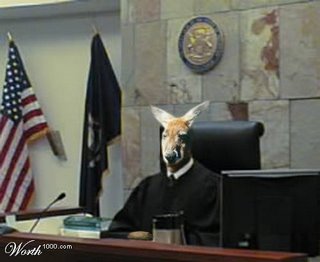Is Habeus Corpus Really Dead?

Well. The first legal challenge to Bushco's new "everyone we say is a terrorist is a terrorist & centuries of law on the rights of the accused to know why he's been jailed be damned" legislation is being challenged in a U.S. court.
Those paying attention: civilization as imagined in the law is on the line.
Those not paying attention: go back to sleep. We'll wake you when the jackboots come for you.
"Suspending habeas rights is a step that has been taken only four times previously in U.S. history, and its legality this time will almost certainly be decided by the Supreme Court. "
Counsel for an admitted terrorist--although the admission may have been obtained by torture--filed today for a hearing before a U.S. court, although the recently passed MCA says he can't.
"Because of Binalshibh's alleged admission that he was a key player in the Hamburg cell that carried out the attacks, his legal suit may provide the starkest test yet of America's justice system, legal experts said.
"'It is how our system treats the worst of the worst, the most reviled of the reviled, that shows how true we are to our principles, ' said David H. Remes, who has represented 17 detainees, mostly from Yemen, and coordinated defense arguments to the Supreme Court in the successful Hamdan case.
"Binalshibh may never get the hearing he is seeking. His is one of hundreds of cases the government asked the courts to dismiss immediately after Bush signed the new law. For his part, Binalshibh did little more than assert his habeas rights and ask for a lawyer.
"Binalshibh is part of a select group of detainees that even defense lawyers acknowledge may be guilty -- 14 suspected terrorists the government deemed "high-value detainees," some of whom have allegedly admitted high-level roles in the al-Qaeda attacks. President Bush cited the 14 men, selected from more than 100 terrorist suspects who had been held for years in secret CIA-run prisons, when he successfully lobbied for the military commission law."

2 Comments:
The words of David Remes remind me very much of chief US prosecutor Jackson at the Nuremberg tribunals.
Remes said "it is how our system treats the worst of the worst, the most reviled of the reviled, that shows how true we are to our principles."
Jackson, referring to the often forgotton concept of Universality, said (referring to maintining fair and balanced measures in trying Nazi war criminals) "to pass them a poisoned chalice is to put it to our lips as well."
I agree with both of them. We need not sacrifice our own values and morality, surrender our convictions (and along with them our freedoms) to achieve our goals (peace, freedom, prosperity). We're better than that.
(or so I would hope...)
Well & eloquently said, Misneach. I agree with them, too.
It is nowhere MORE important that we adhere to notions (& mankind's combined experience) of fair trials than when we're dealing with "the lowest of the low." Else we or our descendants find ourselves on the receiving end of the treatment one day.
Thanks for the comment :)
Post a Comment
<< Home